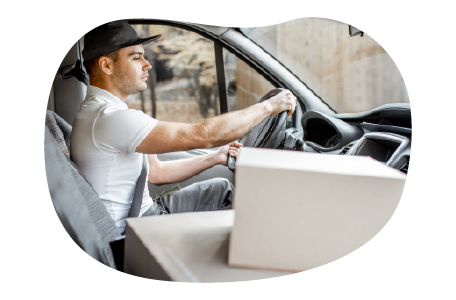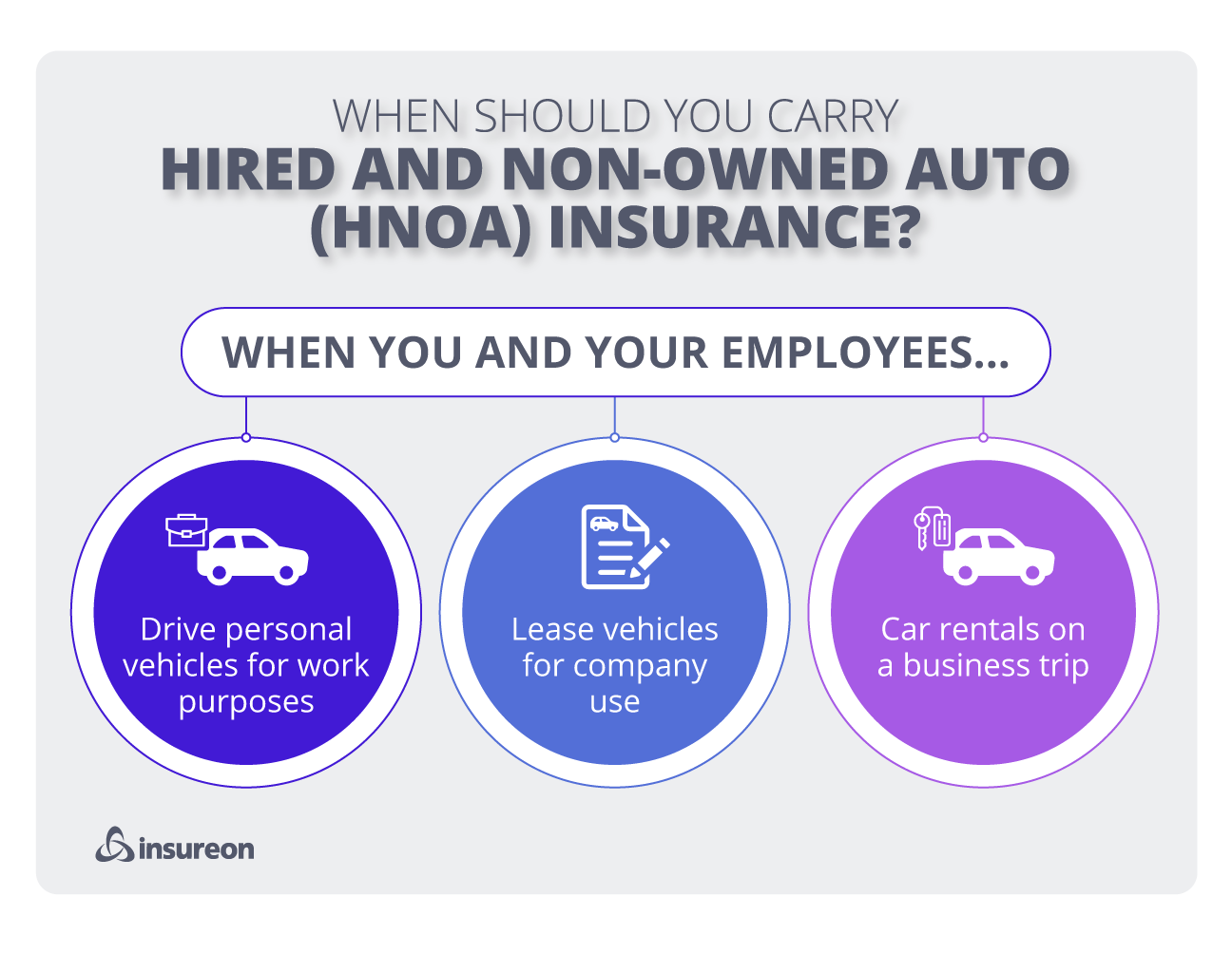
Hired and non-owned auto insurance
Hired and non-owned auto insurance
This policy provides liability coverage for accidents involving personal, leased, or rental vehicles used by your business.
Why is hired and non-owned auto insurance important for small businesses?
Commercial auto insurance only covers business-owned vehicles. Hired and non-owned auto insurance (HNOA) protects vehicles that your business uses but doesn’t own, such as rented, leased, and personal vehicles.
Hired and non-owned auto insurance coverage can help you avoid having to pay for auto liability lawsuits on your own. This type of lawsuit can be extremely expensive, especially if someone is injured, and could financially devastate your small business.
Your personal auto policy covers you while driving to and from work, though it might not cover you for accidents that happen while performing work-related tasks, such as picking up supplies or making deliveries. This means you could be personally liable for non-owned auto liability lawsuits unless you have HNOA insurance coverage.

HNOA insurance provides coverage for:
- Personal vehicles used for work
- Car rentals for a business trip
- Leased vehicles
What does hired and non-owned auto insurance cover?
HNOA insurance helps cover liability expenses, including lawsuits, related to car accidents that occur in your personal, rented, or leased car that you use for business purposes.
Specifically, HNOA insurance coverage includes:
Property damage liability
If you or one of your employees gets into an accident with their personal, rented or leased car and it causes physical damage to another vehicle or someone else's property, hired and non-owned vehicle insurance can help cover your legal costs.
Bodily injury liability
HNOA insurance can help cover the cost of a lawsuit if a personal, rented, or leased vehicle driven for your business injures someone.
How much does hired and non-owned auto insurance cost?

Your HNOA insurance cost is based on several factors, including:
- Number of vehicles
- Vehicle value
- Level of risk
- Claims history
- Employee driving records
- Policy deductible and limits
Verified business insurance reviews
Hear from customers like you who purchased small business insurance.
How does HNOA insurance work?
Many businesses add hired and non-owned auto coverage to their general liability insurance or their commercial auto insurance policy. You can also purchase HNOA insurance separately (depending on the carrier), but sometimes buying the policies together can lower your insurance rates.
If your small business has higher than average non-owned auto liabilities, you can increase your coverage limit with commercial umbrella insurance. Umbrella insurance increases your maximum policy limit, meaning your insurance company can cover more expensive lawsuits.
What is an example of a hired and non-owned auto claim?
Here are a few examples where an HNOA claim would be appropriate:
- A pizzeria delivery driver is using their own vehicle for deliveries. While on a pizza run, they accidentally rear-end another motorist.
- A broadcasting business rents a car to transport a guest, but they're side-swiped at an intersection.
- A consultant uses their own car to travel from the office for client meetings. On the way to meet with a prospective client, they get into an accident and the other motorist suffers medical injuries.
HNOA claims are intended to protect your business against the costs associated with accidents in your employees' personal vehicles, or vehicles leased and rented by your company.
Who needs hired and non-owned auto insurance?
Non-owned auto insurance benefits a variety of small business owners that utilize personal, leased or rented vehicles for their business.
You might consider a HNOA insurance policy if:
You or your employees use a personal car
Small businesses often need this coverage without realizing it. You might not think it’s a big deal to occasionally ask employees to use their own vehicles for work errands. But that can lead to auto liability issues.
For example, an employee might be involved in an accident while driving their own car to meet a client. Because personal auto insurance doesn’t cover work driving, the other party could sue to recoup medical expenses or repair costs.
You're an independent contractor or self-employed
If you're an independent contractor or self-employed, your personal auto insurance won't provide protection if you're in an accident while completing a work errand. HNOA insurance would provide the same coverage to you as if you're an employee.
You rent vehicles
If your business rents vehicles such as trucks or vans, or operates under a trucking contract, HNOA insurance would provide coverage for your rented automobiles.
For example, if you or an employee has an accident while driving a rental car during a delivery run, HNOA insurance covers the costs of any resulting lawsuits.

Top professions that need non-owned auto insurance
Don't see your profession? Don't worry. We insure most businesses.
What does non-owned auto insurance not cover?
While non-owned auto insurance does provide coverage for several liabilities, it does not provide all the protection that a small business might need.
For instance, a HNOA policy does not cover:
Auto repairs
Hired and non-owned auto insurance only includes liability protection. It will not pay for vehicle damage or theft.
You should look to your personal auto insurance policy or rental agreement for coverage. However, this option might not be included in a standard policy.
Business-owned vehicles
Commercial auto insurance, not hired and non-owned auto insurance, helps pay for medical bills and property damage related to an accident in a business-owned vehicle.
A commercial auto policy also covers vehicle theft and other types of damage to a company vehicle. You can often add endorsements to your commercial auto policy, such as drive other car insurance, to expand your coverage.
Read more to learn the difference between commercial auto and non-owned insurance.
Personal use of vehicles
Hired auto insurance only covers accidents that take place while you’re using a personal or rented vehicle for work purposes. It doesn’t cover accidents that happen while you’re using the vehicle for personal errands, which includes your commute to and from work.
Recently purchased vehicles
If you purchase a non-business vehicle and it's not yet covered by your HNOA policy, you would be responsible for any liabilities that may occur to the vehicle.
In order to protect any recently purchased non-business vehicles, you should get any auto liability coverage, which offers a temporary extension of your hired and non-owned auto coverage.

General liability insurance
Business owner’s policy
Errors and omissions insurance
Cyber insurance
Workers’ compensation insurance
FAQs about hired and non-owned auto insurance
Get answers to frequently asked questions about hired and non-owned auto insurance.
What is the difference between HNOA and personal auto insurance?
Personal auto insurance policies only cover claims related to personal use, including your commute and travel unrelated to work. They have lower limits and usually cost less.
If you’re involved in an accident while driving your personal car for work, your insurance company might refuse your claim. That’s why small business owners who own a car used for work should consider commercial auto insurance or HNOA coverage.
If you’re uncertain which policy you need, check with an insurance agent.

The line between a personal vehicle and a commercial vehicle is sometimes unclear. Find out which types of auto insurance cover vehicles used for work.
What are HNOA insurance limits?
HNOA insurance limits can be defined as the maximum amount of money your insurance company will pay. These limits are set when purchasing your HNOA policy and often match the limits of your general liability policy.
Among Insureon policyholders, the average limit is $1 million for auto insurance.
How do I get proof of insurance?
Business owners can usually get proof of insurance online on the same day that they start a small business insurance policy through Insureon.
It can take several weeks for a traditional insurance agency to send a certificate of liability insurance to new customers. That’s an issue for business owners who need immediate proof of insurance.
With Insureon, you can quickly provide proof before a vehicle is used for business purposes. If your bank or lessor requires other proof of insurance, you can contact an agent for more information.
Can you add an additional insured on hired non-owned auto coverage?
Small business owners can extend their HNOA coverage to subcontractors and other individuals as additional insured endorsements.
For example, a business hires a contingent worker through a staffing agency to assist with a temporary employee shortage. The business could add an endorsement to the HNOA policy that would allow the temporary employee to drive leased, rented, and personal vehicles for a fixed period of time.
What is the difference between temporary substitute auto and hired and non-owned auto coverage?
A temporary substitute automobile is a vehicle that is temporarily used by the non-owner as a substitute ("loaner") vehicle. A common example of this is when an auto repair shop provides temporary substitute vehicles for customers while they wait for their repairs.
If you're on the road with a temporary vehicle while using it for business purposes and get into an accident, your HNOA and personal auto policy would not cover the costs, and the expenses would be your responsibility.
If you plan on regularly using temporary substitute vehicles, you may want to consider a business auto policy (BAP) which covers all vehicles used by your business and your employees, including temporary substitute automobiles.
Where can I learn more about hired and non-owned auto insurance?
If you want to learn more about this policy, you can find additional answers in our frequently asked questions about hired and non-owned auto insurance.
If you have any additional questions about coverage or building your risk management plan, you can contact an Insureon agent.


























